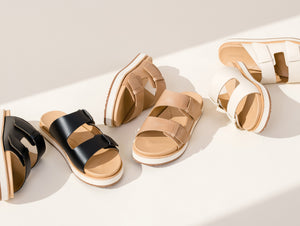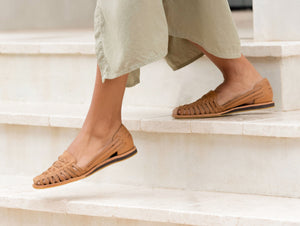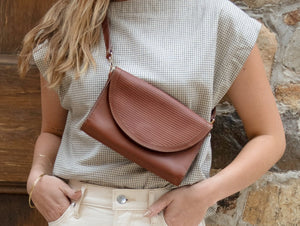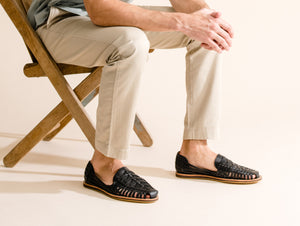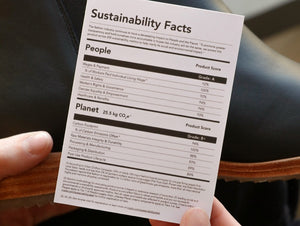We interviewed our Impact Associate, Matt Stockamp, to learn what interested him about sustainable fashion in the first place.
How To Get A Job In The Sustainable Fashion Industry
What does your job entail?
Everything we make at Nisolo has an impact on people and the planet. The heart of my job is identifying the people and natural resources behind our products, assessing how they’re impacted by what we do, and then creating programs that empower them to thrive. A tangible example is providing a living wage and financial literacy training for our producers so their families can achieve their aspirations. For the planet, it’s measuring our carbon footprint and investing in carbon insetting in the Peruvian Amazon to preserve old-growth forests and offset our products’ environmental impact.
When did you first become interested in ethical fashion?
Five years ago I spent a summer in college working with factory workers in India and had the privilege to hear several of their stories. One day outside of Bangalore, a group of women who were members of a labor union at a nearby factory invited me into their home to share their experiences working for fast fashion brands. “We earn three dollars a day,” one woman said. Another shared, “My dream is to go to college, but that probably won’t happen since working at a factory does not allow me the time or money to do it.” She and I were both 21 years old at the time, and her story encouraged me to ask some questions. Why is the fashion industry holding tens of millions of people around the world in poverty if it could be a massive vehicle for poverty alleviation? Why do consumers not know about the social and environmental injustices happening in the fashion industry? On a more personal note, her story inspired a good share of soul searching. How are you using the privilege you have to uplift others? In the words of Mary Oliver, “What is it you plan to do with your one wild and precious life?”
How did you get involved at Nisolo?
After my time in India I knew I wanted to find work with an ethical fashion brand. I also wanted to spend at least a year outside the US to learn Spanish and experience life in a foreign country. That led me to looking at brands working in Latin America and Nisolo happened to have an internship leading social impact measurement and programming at the time. I resonated with the company’s vision, applied for the job, and got it two weeks before graduating from college. I’ve been with the company for almost four years now and am more passionate about our work now than ever before.
What is your favorite thing about our industry?
I love the diversity of people within our industry. There is someone behind everything we wear, each with his/her own story full of joy, sorrow, challenges, and dreams. I like how fashion can be used as a medium to uplift everyone involved in the process–from the factory worker to the customer. When done right and responsibly, fashion is a catalyst for change.
What has surprised you the most about working in sustainability?
It’s an extremely inclusive line of work. Whereas most of the fashion industry is pretty cut-throat, I’ve found that people working in sustainability are quick to collaborate because we recognize that we cannot make this industry sustainable on our own. For example, when I start working on a project I lack experience in, I know the people at Patagonia, Allbirds, and Reformation are there to help. And vice-versa. We celebrate one another’s accomplishments and are quick to share knowledge.
What excites you about the future?
I believe that we as consumers hold the power to transform the fashion industry. Brands respond to our demand, and I’m excited to see that more consumers are considering the social and environmental impact of their products before purchasing. A recent study by Global Fashion Agenda showed that 75% of consumers view sustainability as extremely or very important, and more than 50% of consumers plan to switch brands in the future if another brand acts more environmentally and socially friendly than their preferred one. Consumers are becoming more conscious and that’s incredibly promising for the future of our industry.
What advice would you give to someone interested to work in the sustainable fashion industry?
Sustainability in fashion is a growing movement and more brands are recognizing the need to incorporate it as an integral part of their business. That said, you can expect to see more job openings related to sustainability popping up! There are several ways to get into this line of work depending upon your interest in the social and/or environmental impact of fashion. Start by asking yourself what you’re passionate about. What problem in this industry disturbs you and how could you address it through your work? Identify brands confronting those issues and reach out to them to get a sense of what their needs are. Then, develop those skills and start applying for positions. A handful of colleges offer fashion sustainability programs and you can also do a lot of learning on your own.
If you’re already working at a fashion brand (or a company in any industry for that matter), get curious about your company’s social and environmental impact and start advocating for better practices. Sustainability is not something that one person or department owns. It’s a team effort.
Who inspires you?
I’m inspired by our producers in Peru. They’ve given me so much more than I could ever hope to give them. Their stories are heavy and rich, characterized by resilience and hope. I think it’s important to approach life as a student, and I’ve taken to regularly asking for words of wisdom from our producers. Here are some of the things they’ve shared with me.“We should use the time God gives us here to do the things we love. And we should do good for ourselves and our families.” and“More than anything else, I think success depends on your willingness to learn.”
Favorite pair of Nisolos?
The Travel Derby! I work remotely and logged about six months away from home last year. This shoe is a gamechanger for minimalist packing. Besides my running shoes, it’s the only shoe I bring on a trip. It goes with just about everything, you can dress it up or down, and there’s no break-in period. It also means a lot to me to know that it was made in an ethical factory in Mexico that I’ve visited personally. The people who make the travel derby are earning a living wage and receiving free classes in the factory to help them complete their GED if they didn’t finish high school.












